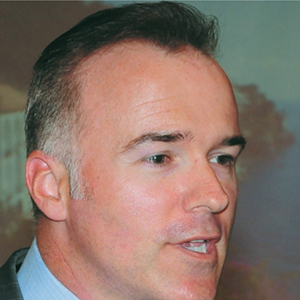
FRONT OF THE ROOM – By Brian Lange
Don’t rush to fix situations with your first reply
 Quick! Think of what you might say as a trainer to respond to a learner who shares the following observation:
Quick! Think of what you might say as a trainer to respond to a learner who shares the following observation:
“I’ve seen programs roll out like this before. There’s a flurry of initial activity, then it just fades away until some executive reads the next great sales book — and the cycle begins again.”
Now, stop. Really consider what you think you might say in this situation. Pause and come back to the text below in a moment.
The Right Stuff
Based on what you realized you might have said, now ask yourself whether your response in some way attempted to “fix” or “solve” the issue for the learner.
- Did you ask a question to attempt to clarify or gain more insight into the problem (probe)?
- Did you offer additional info on how this program will be different based on manager coaching guides and training (logic)?
- Did you attempt to “sell” the other on the benefits of this program (reason)?
While it’s natural to want to help someone see things differently, or get them “onboard,” you don’t really know yet what they need from you. Reassurance? More background information? Upcoming plans? A compassionate ear? Pep talk? Perhaps it’s wisest to let them carry the ball for a bit longer.
The Right Intention
So, to avoid attempting to fix or resolve the issue in your first response, here’s a strategy that may seem counterintuitive: Consider not trying to proffer the perfect, sanguine, world-class answer! Focus, rather, on intention – that will help you collaborate with the other person.
Table 1 looks at some potential scenarios.
The key in these situations is to focus on accepting where the learner is at that moment — and challenging yourself not to fix or resolve the issue with your first response.
I always keep a mindset that positions me for flexing to the situation at hand: “It’s all good!” This guarantees a relaxed, accepting, inviting tone from me that conveys my intention of including or exploring (celebrating?) a participant’s input.
I find a way to roll with whatever the learner has put out there — without risking judgment, condescension or any other unintended consequence of evaluating or shooting down someone’s input.
Right Attitude
So often, we struggle for — even train for — finding the perfect turn-of-a-phrase or suitable words that will soothe or remedy a question, position or answer that a learner has sent our way. We feel the pressure: the eyes of the audience upon us and the desire for the perfect salvo to lift us from this potentially uncomfortable or crucial moment.
I’d like to suggest we relax just a bit. Standing in the front of the room doesn’t mean you’re expected to become superhuman, prescient or other-worldly. It can feel like an awful lot is riding on your answer:
- The learner’s future engagement.
- That others may be swayed (“negatively”) to agree with learner’s position.
- The audience’s respect or credibility felt for the speaker.
- Judgments or opinions of other trainers or leaders in the room.
Intention trumps specific word-choice every time and can help limit fixing or resolving too soon. If you truly desire to demonstrate acceptance, help your learner feel heard, and respond in a way that supports and ensures continued engagement.
Then your intention will be clear — and the right words will emerge.
 Brian Lange is with Perim Consulting and serves as lead facilitator for LTEN PrimeTime! For Trainers Core and Masters Workshops. Email Brian at blange@perim.com or connect with him on LinkedIn at www.linkedin.com/in/brianplange.
Brian Lange is with Perim Consulting and serves as lead facilitator for LTEN PrimeTime! For Trainers Core and Masters Workshops. Email Brian at blange@perim.com or connect with him on LinkedIn at www.linkedin.com/in/brianplange.







